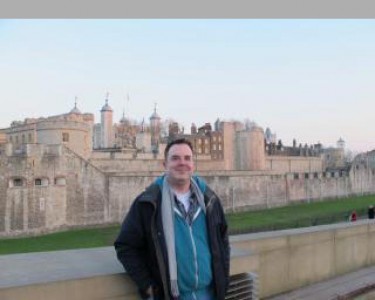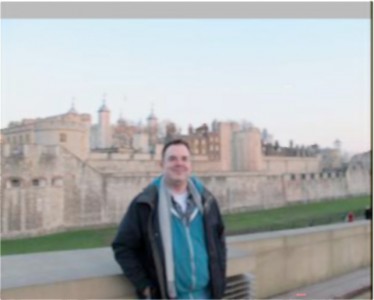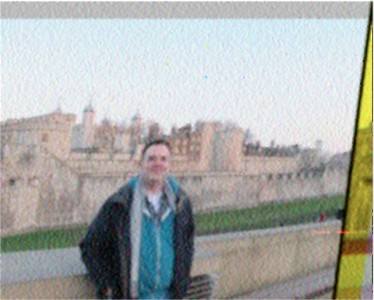Experiments with SSTV in the presence of noise…
Last night while watching television, I decided to code up an SSTV modulator for the most popular US mode, which is reportedly Scottie 1. I had done most of the heavy lifting when I created a Robot36 encoder a few years ago, so I mostly cribbed the meat out of that code, and modified it to do the details of Scottie 1, which (since it is in RGB space rather than YUV) is rather simpler than the original code. Once I had that working, I decided to do some experiments using Multiscan, an SSTV decoder that I had on my Macbook Pro.
First, I needed some source material. I chose this picture of myself in front of the Tower of London, for no other reason than simple expediency. It does however have some nice features. It contains a faily uniform sky background, and then the tower itself is highly detailed, but with fairly low contrast. Here is the original, which was downsampled to 320×240, padded with 16 lines of gray, and then upsampled to an easier to view 640×512. Consider this the “ground truth” image. (Click on the image to view it full resolution)
Using my modulator code, I then encoded it in Scottie 1 mode. I then used a loop back cable to play it back into the line input on my Macbook, and fed it to Multiscan, the better of the two programs that I know to do SSTV on the Mac. Here’s the resulting image:
Not exactly stellar. In fact, downright blurry. I wasn’t too pleased with the quality of this. My suspicion is that MMSSTV will do a better job, but I left my Windows laptop at work, so I can’t really be sure. It’s also possible (although I think somewhat unlikely) that my modulator is the source of the blurriness.
I also made a version of the audio file with some fairly strong additive white Gaussian noise added.
Multiscan wasn’t able to get the sync properly at this signal to noise ratio. I find that a little surprising, it seems to me rather straightforward to solve this problem. You can also see that the overall quality is quite a bit lower.
So, I’m curious: do any other SSTV decoders do better? In the interest of trying to find the best performing decoders, I will put links to the uncompressed 11025Hz .WAV files which I used for these tests. If you try them out with your favorite SSTV decoder, feel free to drop me an email with the decoded images (or links to them on flickr or picasa or whatever) along with details of what software you used, and whatever special operations or processing you did. If I get any good response, I will summarize in a future posting.
Scottie 1 SSTV, WAV format, 11025Hz sample rate, no noise.
Scottie 1 SSTV, WAV format, 11025Hz sample rate, substantial additive Gaussian white noise.
Thanks for any response! In the future, I’d like to do a more systematic evaluation of analog SSTV modulators, demodulators, and modes.
Addendum: For my reference on the implementation of modes, I used JL Barber’s excellent paper on SSTV modes. In his description of Scottie 1, he says that the first scanline has an anomalous sync pulse (9ms of 1200 Hertz). When I tried that with Multiscan, it never got started: it seemed to have some problem. When I deleted that sync pulse, everything starts as expected. If anyone tries this experiment, I’d like to hear of any failures to start. Also, if anyone knows of any definitive Scottie 1 examples on the web, let me know.



I recall burning three or four weeks of a sabbatical getting Saccade.com on the air with Wordpress. So much tweaking…